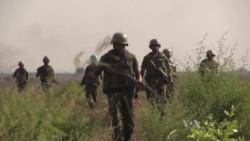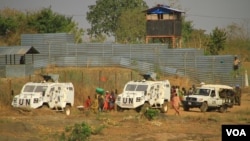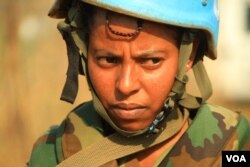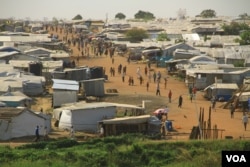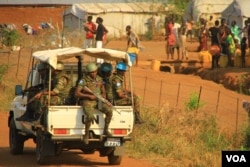The road outside the U.N. protection of civilians (POC) site in Juba is quiet on this December day, and the Ethiopian peacekeepers guarding the site want to keep it that way.
So the battalion of several dozen soldiers braves intense afternoon heat to conduct a careful patrol of the area. First they circle the site's perimeter, watching closely as a truck filled with charcoal bags is unloaded. They venture farther from the site to enforce a new "weapons-free zone" that in theory extends 200 meters from the POC site fences.
They also walk near an impromptu graveyard. Sometimes, they say, they assist people burying their loved ones there.
The U.N. mission in South Sudan, UNMISS, has stepped up its patrols of the POC site since human rights groups said it did not do enough to protect civilians from violence that struck Juba in July. More than 300 people were killed in those attacks, and rapes, looting and other violence also took place.
"After the July crisis, the accomplishment of the patrol is increased from day to day. So, there is no interruption, night and day. There is no interruption," said Major Aschalew Gedef, chief of operations for the Ethiopian battalion of UNMISS.
The mission has installed more watchtowers around the site, and patrols now escort women to collect firewood in response to concerns about an increase in sexual violence against residents of the POC camp.
Eliza Joseph is a 22-year-old internally displaced person (IDP) who has stayed at the POC site since South Sudan erupted in violence in December 2013. She says she has friends who have been raped outside the site, but she believes security is better now.
"These days, I'm able to go outside," Joseph said. "But in those days, when there was conflict here, I was unable to go outside."
But another IDP, Buom Kobuong Gatduop, argues that life is still quite grim.
"We don't have enough water. We don't have enough food," he said. “Security [is] not very OK, and life is actually very terrible. Kids don't go to school. Elderly people are dying because there [are] no good medical services."
Tensions have continued to grow between the government and the U.N. mission. South Sudan initially rejected a proposal to deploy an additional 4,000 U.N. peacekeepers to the country in the wake of the fighting in July, but now has agreed to allow them, even though the technicalities are still being worked out.
"We are still being restricted from conducting patrols, across the country, not just in Juba," said UNMISS spokeswoman Shantal Persaud, who says freedom of movement is limited for the existing force of about 12,000 peacekeepers and police.
South Sudan has six POC sites hosting about 224,000 IDPs; Juba's site houses 39,000. Most of the camps have been in existence since the conflict began in December 2013.
Michael Makuei Lueth, South Sudan's Minister of Information, argues that the United Nations has overstepped its mandate by establishing POC sites for what he calls "fundraising" purposes.
"And if there are [U.N.] people who are living on these people [IDPs], if you remove them, then you have deprived them of their livelihood. This is how I understand it. This is not correct. We want all these people to be taken to their home areas," he said. If U.N. representatives "are unable to provide the protection, should they, will they assemble all the people of South Sudan in the POCs so they will protect them?"
Persaud said the POC sites were never intended to become permanent.
But they may be around for a long time, as the conflict in South Sudan shows no signs of stopping. U.N. human rights officials warned again this week that "a steady process of ethnic cleansing" is underway in some parts of South Sudan and could intensify.




